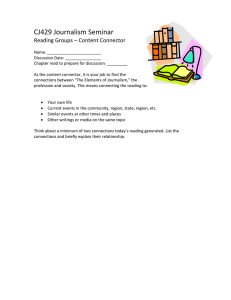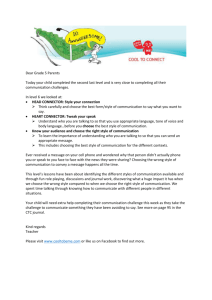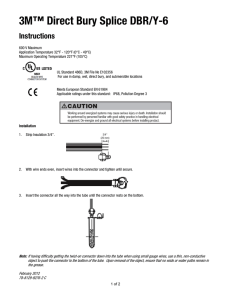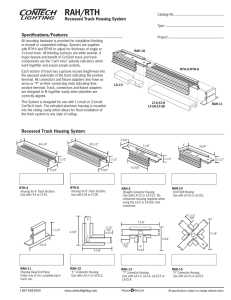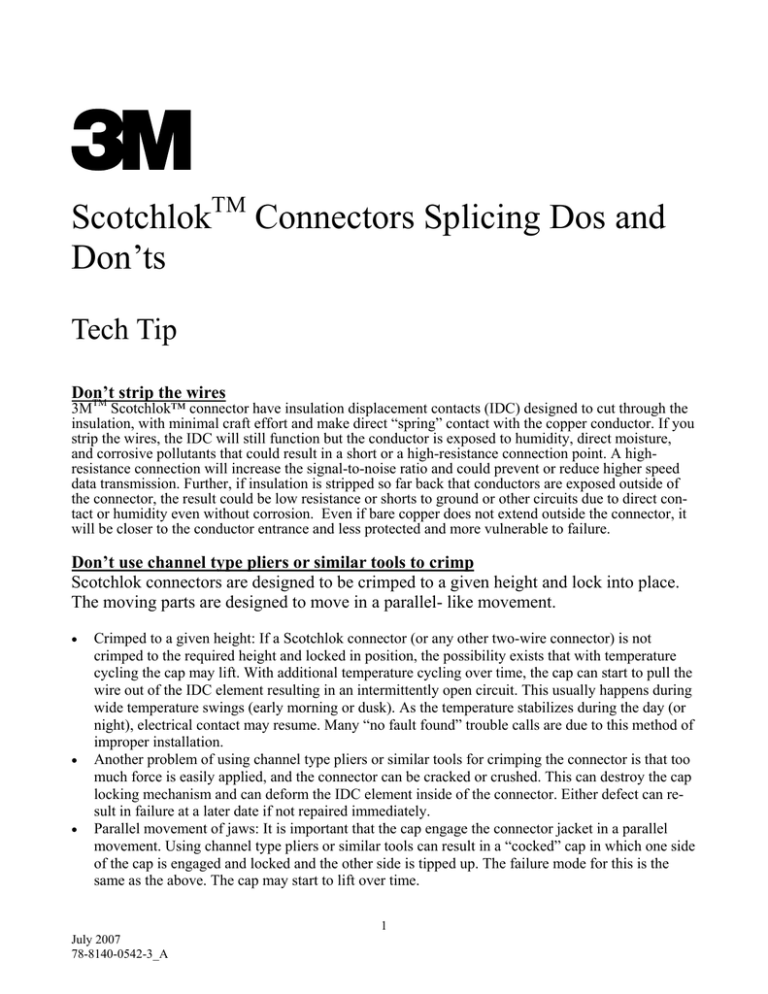
ScotchlokTM Connectors Splicing Dos and
Don’ts
Tech Tip
Don’t
strip the wires
TM
3M Scotchlok™ connector have insulation displacement contacts (IDC) designed to cut through the
insulation, with minimal craft effort and make direct “spring” contact with the copper conductor. If you
strip the wires, the IDC will still function but the conductor is exposed to humidity, direct moisture,
and corrosive pollutants that could result in a short or a high-resistance connection point. A highresistance connection will increase the signal-to-noise ratio and could prevent or reduce higher speed
data transmission. Further, if insulation is stripped so far back that conductors are exposed outside of
the connector, the result could be low resistance or shorts to ground or other circuits due to direct contact or humidity even without corrosion. Even if bare copper does not extend outside the connector, it
will be closer to the conductor entrance and less protected and more vulnerable to failure.
Don’t use channel type pliers or similar tools to crimp
Scotchlok connectors are designed to be crimped to a given height and lock into place.
The moving parts are designed to move in a parallel- like movement.
•
•
•
Crimped to a given height: If a Scotchlok connector (or any other two-wire connector) is not
crimped to the required height and locked in position, the possibility exists that with temperature
cycling the cap may lift. With additional temperature cycling over time, the cap can start to pull the
wire out of the IDC element resulting in an intermittently open circuit. This usually happens during
wide temperature swings (early morning or dusk). As the temperature stabilizes during the day (or
night), electrical contact may resume. Many “no fault found” trouble calls are due to this method of
improper installation.
Another problem of using channel type pliers or similar tools for crimping the connector is that too
much force is easily applied, and the connector can be cracked or crushed. This can destroy the cap
locking mechanism and can deform the IDC element inside of the connector. Either defect can result in failure at a later date if not repaired immediately.
Parallel movement of jaws: It is important that the cap engage the connector jacket in a parallel
movement. Using channel type pliers or similar tools can result in a “cocked” cap in which one side
of the cap is engaged and locked and the other side is tipped up. The failure mode for this is the
same as the above. The cap may start to lift over time.
1
July 2007
78-8140-0542-3_A
Don’t use small pliers or similar tools to crimp
•
Most small pliers operate at a very low mechanical advantage. Because of this, the hands of craft
technicians may tire, resulting in incomplete crimps. In addition, most pliers have a non-parallel
movement that may tip the connector caps.
Do Use 3M™ Scotchlok™ Crimping Tools
•
3M offers multiple crimping tools that vary from 3/1 to 10/1 mechanical advantage.
•
3M™ Scotchlok™ Tools operate in a parallel like movement to ensure that caps are not tipped.
They also all have mechanical stops to ensure that the connector is not over-crimped (crushed). The
following tools would be recommended for the CATV Industry:
E-9Y: 3/1 mechanical advantage (has
wire cutter feature)
E-9E: 4/1 mechanical advantage
E-9J: 10/1 mechanical advantage
E-9R: 10/1 mechanical advantage (has
wire cutter feature, spare blade &
ratchet release)
3M and Scotchlok are trademarks of 3M Company.
Important Notice
All statements, technical information, and recommendations related to 3M’s products are based on information believed to be reliable, but the accuracy or
completeness is not guaranteed. Before using this product, you must evaluate it and determine if it is suitable for your intended application. You assume all
risks and liability associated with such use. Any statements related to the product which are not contained in 3M’s current publications, or any contrary
statements contained on your purchase order shall have no force or effect unless expressly agreed upon, in writing, by an authorized officer of 3M.
Warranty; Limited Remedy; Limited Liability.
This product will be free from defects in material and manufacture for a period of one (1) year from the time of purchase. 3M MAKES NO OTHER
WARRANTIES INCLUDING, BUT NOT LIMITED TO, ANY IMPLIED WARRANTY OF MERCHANTABILITY OR FITNESS FOR A PARTICULAR PURPOSE. If this product is defective within the warranty period stated above, your exclusive remedy shall be, at 3M’s option, to replace or
repair the 3M product or refund the purchase price of the 3M product. Except where prohibited by law, 3M will not be liable for any indirect, special,
incidental or consequential loss or damage arising from this 3M product, regardless of the legal theory asserted.
Communication Markets Division
3M Telecommunications
6801 River Place Blvd.
Austin, TX 78726-9000
800.426.8688
Fax 800.626.0329
www.3MTelecommunications.com
© 3M 2007. All rights reserved.
July 2007
78-8140-0542-3_A
2

